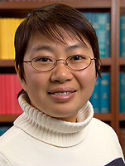Risk for contralateral breast cancer among carriers of the CHEK2*1100delC mutation in the WECARE Study Journal Article
| Authors: | Mellemkjær, L.; Dahl, C.; Olsen, J. H.; Bertelsen, L.; Guldberg, P.; Christensen, J.; Børresen-Dale, A. L.; Stovall, M.; Langholz, B.; Bernstein, L.; Lynch, C. F.; Malone, K. E.; Haile, R. W.; Andersson, M.; Thomas, D. C.; Concannon, P.; Capanu, M.; Boice, J. D. Jr; WECARE Study Collaborative Group; Bernstein, J. L. |
| Contributors: | Liang, X.; Wolitzer, A.; Orlow, I.; Begg, C. |
| Article Title: | Risk for contralateral breast cancer among carriers of the CHEK2*1100delC mutation in the WECARE Study |
| Abstract: | The protein encoded by the CHEK2 gene is involved in cellular repair of DNA damage. The truncating mutation, CHEK2*1100delC, seems to increase the risk for breast cancer. We investigated whether the CHEK2*1100delC mutation carrier status increases the risk for asynchronous contralateral breast cancer (CBC) and whether it interacts with radiation therapy (RT) or chemotherapy in regard to CBC risk. The germline mutation frequency was assessed in 708 women with CBC and 1395 women with unilateral breast cancer (UBC) in the Women's Environment, Cancer and Radiation Epidemiology (WECARE) Study whose first primary breast cancer was diagnosed before age 55 years and during 1985-1999. Seven women with CBC (1.0%) and 10 women with UBC (0.7%) were CHEK2*1100delC variant carriers (rate ratio (RR)=1.8, 95% confidence interval (CI)=0.6-5.4 for CBC vs UBC). Carriers who received RT for their first breast cancer, compared with non-carriers not treated with RT, had an RR of developing CBC of 2.6 (95% CI=0.8-8.7). We found no significant associations between the CHEK2*1100delC mutation and CBC overall or among those treated with RT. However, the sampling variability was such that modest increases in risk could not be excluded. Nonetheless, because this is a rare mutation, it is unlikely to explain a major fraction of CBC in the population. © 2008 Cancer Research UK All rights reserved. |
| Keywords: | adult; cancer chemotherapy; controlled study; middle aged; gene mutation; major clinical study; case-control studies; doxorubicin; fluorouracil; cancer risk; cancer radiotherapy; chemotherapy; methotrexate; dna damage; gene; dna repair; breast cancer; genes; genotype; risk factors; combination chemotherapy; cyclophosphamide; breast neoplasms; heterozygote; protein-serine-threonine kinases; family history; seer program; epirubicin; radiation therapy; checkpoint kinase 2; mutation rate; estrogen receptor; germ-line mutation; 1100delc mutation; asynchronous contralateral breast cancer; chek2; chek2 gene |
| Journal Title: | British Journal of Cancer |
| Volume: | 98 |
| Issue: | 4 |
| ISSN: | 0007-0920 |
| Publisher: | Nature Publishing Group |
| Date Published: | 2008-02-26 |
| Start Page: | 728 |
| End Page: | 733 |
| Language: | English |
| DOI: | 10.1038/sj.bjc.6604228 |
| PUBMED: | 18253122 |
| PROVIDER: | scopus |
| PMCID: | PMC2259175 |
| DOI/URL: | |
| Notes: | --- - "Cited By (since 1996): 3" - "Export Date: 17 November 2011" - "CODEN: BJCAA" - "Source: Scopus" |
Altmetric
Citation Impact
BMJ Impact Analytics
Related MSK Work









